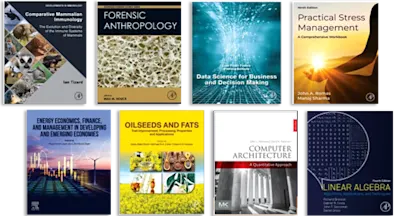
Nanomaterials for Environmental Remediation
Monitoring, Protection, and Sustainability
- 1st Edition - June 1, 2026
- Imprint: Woodhead Publishing
- Editors: Virat Khanna, Chander Prakash, Rohit Jasrotia
- Language: English
- Paperback ISBN:9 7 8 - 0 - 4 4 3 - 2 7 5 3 0 - 2
- eBook ISBN:9 7 8 - 0 - 4 4 3 - 2 7 5 3 1 - 9
Nanomaterials for Environmental Remediation: Monitoring, Protection, and Sustainability provides an in-depth analysis of various nanomaterial-based approaches, including nanopa… Read more
Purchase options

- Covers the design and fabrication of nanomaterials tailored for environmental remediation applications
- Includes sustainable strategies for the remediation of contaminated water sources, soils, and air
- Covers integration of nanomaterials into existing environmental remediation technologies
- Addresses environmental implications and safety considerations associated with nanomaterial use
- Discusses policy and ethical considerations, and regulatory frameworks to guide the responsible development and deployment of nanotechnology for sustainable environmental management
1. Nanotechnology and Environmental Challenges
2. Principles of Sustainable Development and Environmental Remediation
3. Nanosensors for Environmental Monitoring
4. Nanomaterials for Real-time Contaminant Detection
Section 2: Nanotechnology Applications in Water Remediation
5. Nanomaterial-based Filtration Systems for Water Treatment
6. Nanomembranes for Desalination and Purification
7. Nanomaterials in Pollution Monitoring and Controlling in River Water
Section 3: Nanomaterials for Soil Remediation
8. Nanoparticle Remediation of Soil Contaminants
9. Nanoscale Heavy Elements Affecting Soil Properties
10. Soil Stabilization using Nanomaterials
Section 4: Nanotechnology for Air Pollution Control
11. Nanomaterials for Air Quality Improvement
12. Nano-based Catalytic Converters for Automotive Emissions
13. Role of Nanomaterials in Pollution Control: Ecosystem and Industrial Revolution
Section 5: Environmental Sustainability, Assessment and Future Perspectives
14. Life Cycle Assessment of Nanomaterial Applications and Ethical and Social Implications of Nanotechnology in Environmental Cleanup
15. Toxicity and Environmental Impact of Nanomaterials
16. Comparison of Advanced and Conventional Techniques Used in Environmental Remediation
17. Future Directions and Challenges in Sustainable Nanotechnology
18. Case Studies: Toward a Greener Future with Nanomaterials and Integration of Nanotechnology into Sustainable Development Goals
- Edition: 1
- Published: June 1, 2026
- Imprint: Woodhead Publishing
- Language: English
VK
Virat Khanna
Virat Khanna is an Associate Professor at the Centre for the Research Impact and Outcome, Chitkara University, Punjab, India and has 14 years of teaching experience. He is a Ph.D. in Mechanical Engineering from Maharaja Agrasen University, HP, India. He completed his M. Tech. in Mechanical Engineering in 2013 and B Tech in Mechanical Engineering in 2008 from I. K. Gujral Punjab Technical University, Jalandhar, India. His areas of research are in the applications of the 2D nanomaterials like graphene, and MXenes and also focused on the use of nanomaterials for environmental remediation and energy applications. He has published more than 30 papers in SCI and Scopus-indexed journals. He is also the editor of several books and conference proceedings with the various international publishers like Elsevier, CRC Press, IGI Global, Bentham Books etc.
CP
Chander Prakash
RJ
Rohit Jasrotia
Presently he is working as Research Fellow and Assistant Professor in the INTI International University, Malaysia and Shoolini University of Biotechnology and Management Sciences, Bajhol, Solan, Himachal Pradesh, India since 2018. He has editored two Elsevier books. He has published over 70 research articles in high-quality international peerreviewed journals, granted 6- Indian patents and 13-book chapters. He is active reviewer of more than 30-reputed internal journals and supervising doctoral and master students in research. He has received best researcher award for his achievements in research and development.